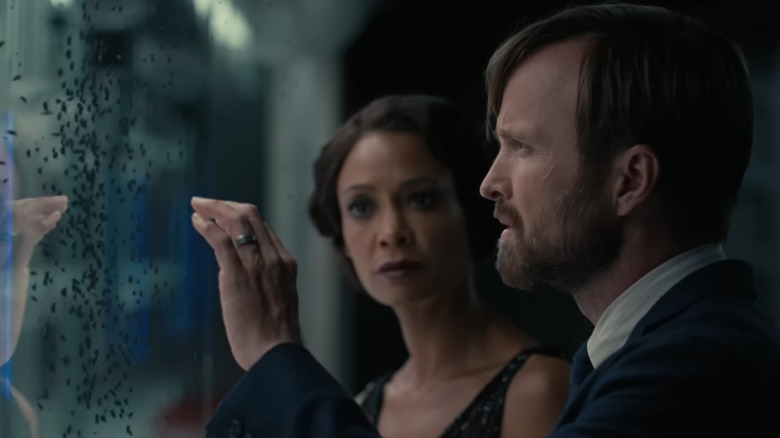Why Mike Flanagan Finds Westworld's Erasure From HBO Max So Worrisome
On Monday, in only the latest shocking move from Warner Bros. Discovery, the media giant's HBO Max streaming service pulled two original shows, "Westworld" and "The Nevers," from its library (via Deadline). Prolific horror filmmaker Mike Flanagan sees it as a bellwether for a worrying trend. While content has been disappearing from the streamer at an alarming rate since this past summer, these removals represent an escalation, most especially that of "Westworld." Not only was the show an HBO original produced at great cost, but it was also wildly popular and a regular award-season darling. The removal came a mere four weeks after "Westworld" was canceled ahead of its planned final season.
As noted by Variety, the move to pull both series from streaming was likely an effort to avoid paying continued residuals to their casts and crews. As Warner Bros. undergoes drastic restructuring in the wake of its purchase by Discovery, it has taken many such severe and unprecedented cost-cutting measures. Decisions like pulling the plug on its nearly completed "Batgirl" film and removing content from HBO Max have been viewed by many as an affront to artistic expression and have shaken confidence in Warner's willingness to put art ahead of profits.
Today, in response to the removal of "Westworld," Mike Flanagan took to social media with a worrisome warning about the future of entertainment.
Flanagan worries about media erasure in the digital age — and he's not alone
In response to HBO's takedown of "Westworld," filmmaker Mike Flanagan took to Twitter with a grim warning about the future of media. The prolific horror director tweeted "In addition to being horribly unfair to the cast and crew, this also underscores the importance of physical media. WESTWORLD is available on Blu-ray, but this will happen to shows that aren't. The cancellation of a series is sad enough — but the erasure of a series is horrifying." Indeed, actors and crew who were relying on residuals from "Westworld" and "The Nevers" now find their income curtailed as they look toward an uncertain future for the entertainment industry. Barring a substantial sea change, many more artists will encounter the same dire straits as the ax falls on their work.
But Flanagan's concerns have been echoed since the dawn of the streaming age. Whether in the realm of film and television, music, or video games, consumers increasingly do not own the media they consume, instead paying monthly fees to access large libraries of online content. When content is removed from those libraries — or if a streaming service disappears entirely — much of the art contained therein will likely disappear into the ether as if it had never existed.
The digital Library of Alexandria
That scenario has already come to pass many times over. In 2017, Google pulled the plug on Project Ocean, an effort to catalog the world's collective literature, after it was struck down in court. The Atlantic compared it to the historical burning of the Library of Alexandria. The same anxiety is found reflected in online communities such as Reddit's r/DataHoarder, where users download vast archives of data ranging from media to webpages onto their personal drives in an attempt at preservation.
In an era where movies and TV shows are often released to streaming without a physical release, the likelihood of their erasure increases. In September, The Washington Post declared "Streaming TV is having an existential crisis," pointing to the removal of shows like HBO's "Infinity Train," which vanished from the service without a trace and even scrubbed its social media presence from the web. And today, Vulture quipped, "The grim reapers at HBO Max are at it again," in an article updating the full list of titles the streaming service has pulled.
Indeed, Mike Flanagan's tweet is not so much a warning as a statement of fact. With no clear way through the problems streaming services are now encountering, their forests of content are decaying, tree by tree. And, as their creations are fed to the woodchipper, those most affected are artists themselves.


